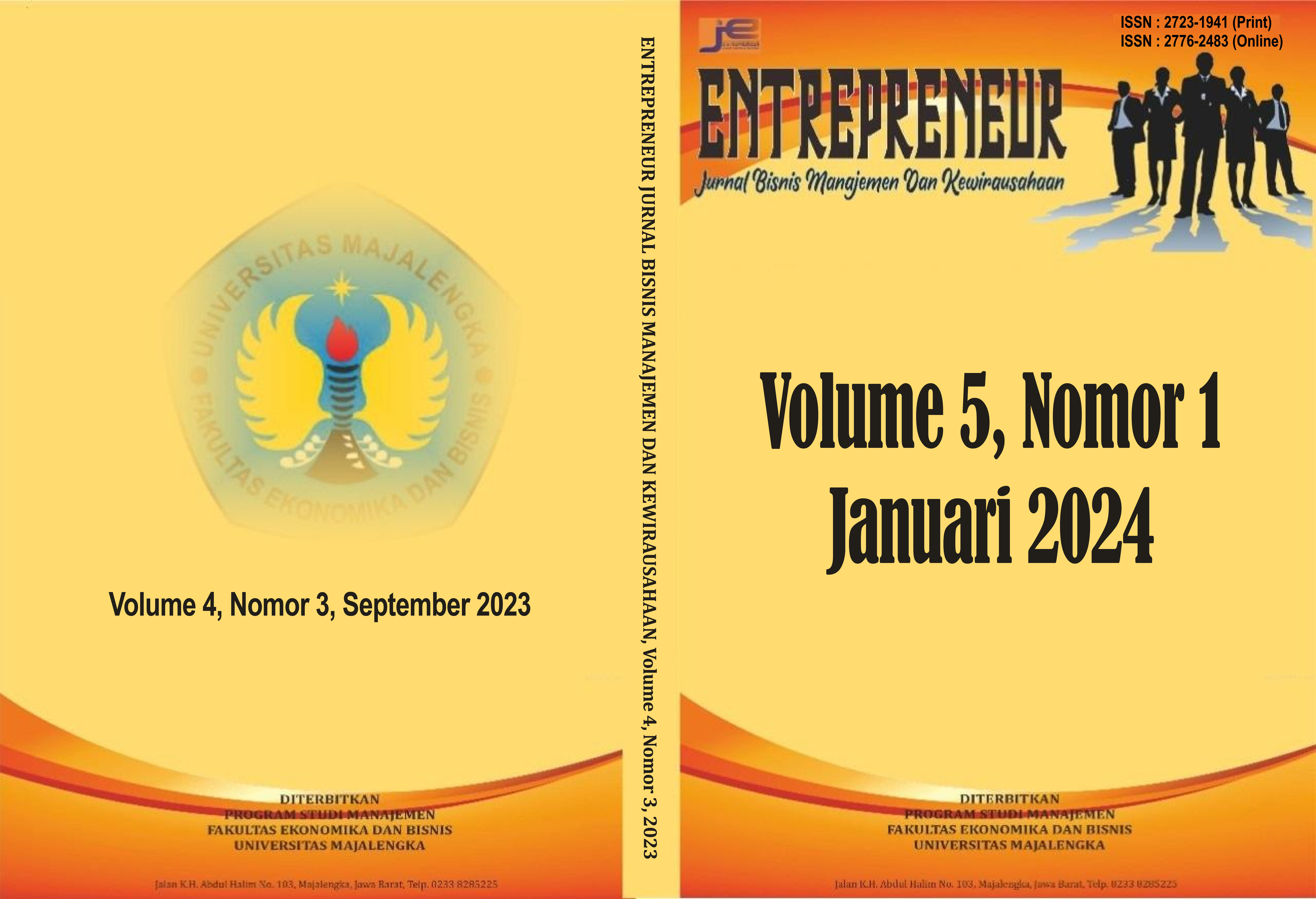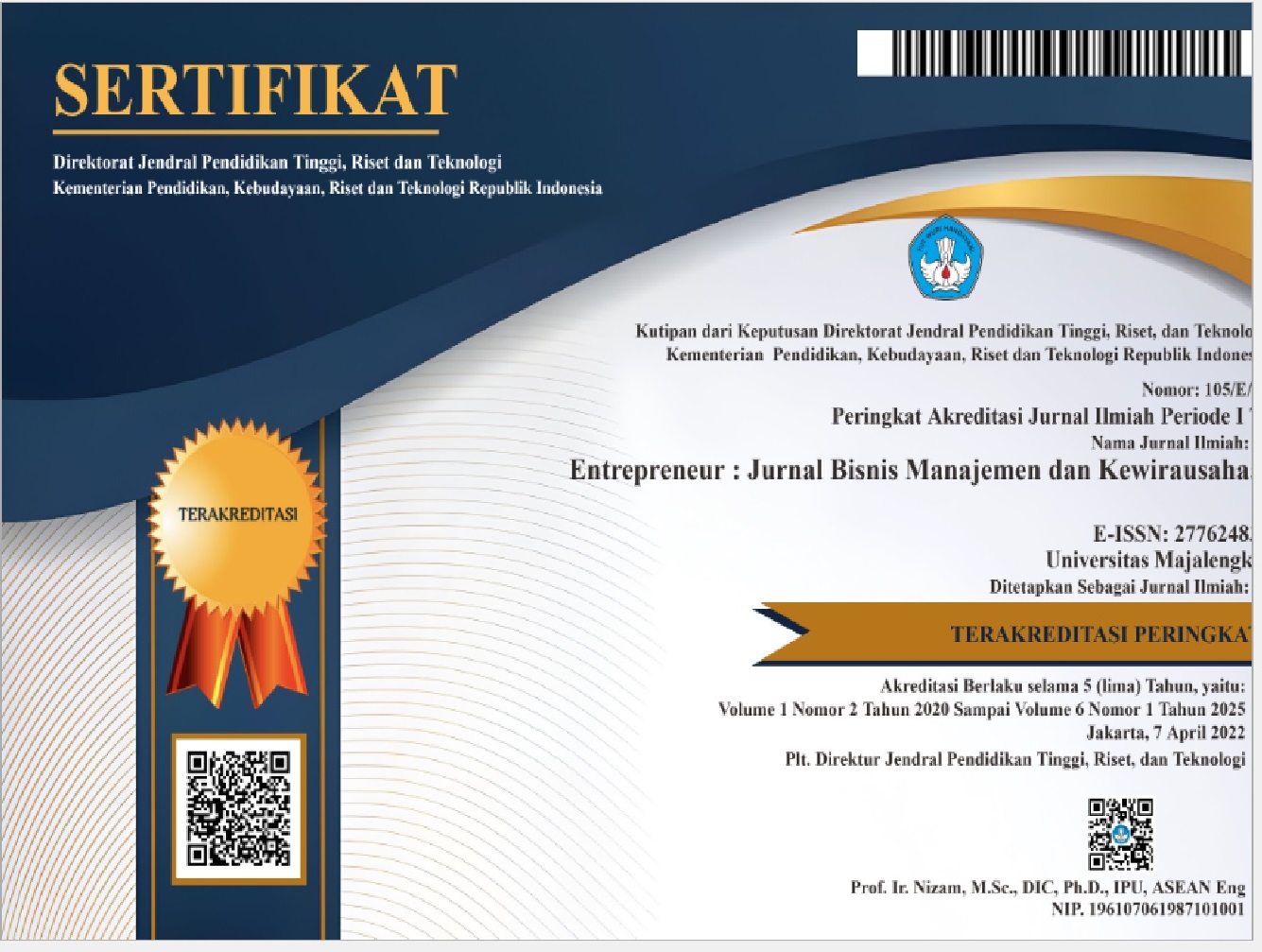Strategi Pemasaran Pedagang Batagor: Studi Kasus Tentang Inovasi Dan Branding
DOI:
https://doi.org/10.31949/entrepreneur.v5i1.7271Abstrak
This article aims to identify the marketing strategies of batagor traders, with a focus on improving taste quality and branding. This research uses a qualitative approach with a case study method, and data collection is carried out through interviews with Batagor traders. The research results found that batagor traders were initially inspired to start a batagor business after experiencing a decline in turnover in their To business. They struggled hard to develop a batagor recipe that suited their tastes and the positive response from their neighbors encouraged them to start a wider batagor business. They maintain the quality of their merchandise with consistency in using recipes, making their own basic ingredients. and choose reliable raw material providers. The conclusion is that the success of Batagor traders is based on determination, perseverance, innovation and the ability to overcome various challenges in business. They maintain the quality of their merchandise with consistency in recipes and raw material management. Additionally, they try to maintain a balance between work and family life by scheduling quality time with their families and supporting each other. All these factors have contributed to the success of Batagor traders in running their business.
Kata Kunci:
Marketing Strategy, Batagor TraderUnduhan
Referensi
Arifen, S. R., Purwanty, V. D., Suci, D. A., Agustiawan, R. H., & Sudrajat, A. R. (2019). Analisis Strategi Pemasaran Untuk Meningkatkan Daya Saing UMKM. Jurnal Administrasi Bisnis, 29(1), 59–66.
Budi Mahardhika, W., & Sunariani, N. N. (2019). Strategi Pemasaran Produk Makanan Catering Melalui Media Sosial Instagram. Jurnal Manajemen Bisnis, 16(1), 13. https://doi.org/10.38043/jmb.v16i1.2015
Ernawati, D. (2019). Pengaruh Kualitas Produk, Inovasi Produk Dan Promosi Terhadap Keputusan Pembelian Produk Hi Jack Sandals Bandung. JWM (Jurnal Wawasan Manajemen), 7(1), 17. https://doi.org/10.20527/jwm.v7i1.173
Hendriyati, L., & Santoso, I. B. (2021). Strategi Pemasaran Food and Beverage Untuk Meningkatkan Penjualan Pada Masa Pandemi Covid-19 Di Cavinton Hotel Yogyakarta, Indonesia. Journal of Tourism and Economic, 4(1), 60–72. https://doi.org/10.36594/jtec.v4i1.111
Isdarmanto, Chiristantinus, Sunarto, H., & Anthony. (2020). Strategi Branding Pengembangan Industri Pariwisata 4.0 Melalui Kompetitif Multimedia di Era Digital. Journal of Tourism and Creativity, 4(1), 1. https://doi.org/10.19184/jtc.v4i1.14383
Prameswari, N. S., Suharto, M., & Wulandari, E. (2018). Strategi Branding Melalui Inovasi Desain Kemasan Bagi Home Industry Sabun Cair. Jurnal Desain Komunikasi Visual, Manajemen Desain Dan Periklanan, 03(02), 35–54.
Wiyono, H. D., Ardiansyah, T., & Rasul, T. (2020). Kreativitas dan Inovasi dalam Berwirausaha. Jurnal Usaha, 1(2), 19–25.

Diterbitkan
Cara Mengutip
Terbitan
Bagian
Lisensi
Hak Cipta (c) 2024 Fini Welsa Agustin fini, Intan Maharani Putri, Wanda Nurjanah

Artikel ini berlisensiCreative Commons Attribution-ShareAlike 4.0 International License.
COPYRIGHT NOTICE
An author who publishes in the Entrepreneur: Jurnal Bisnis Manajemen dan Kewirausahaan agrees to the following terms:
1. Author retains the copyright and grants the journal the right of first publication of the work simultaneously licensed under the Creative Commons Attribution-ShareAlike 4.0 License that allows others to share the work with an acknowledgment of the work's authorship and initial publication in this journal
2. The author is able to enter into separate, additional contractual arrangements for the non-exclusive distribution of the journal's published version of the work (e.g., post it to an institutional repository or publish it in a book) with the acknowledgment of its initial publication in this journal.
3. The author is permitted and encouraged to post his/her work online (e.g., in institutional repositories or on their website) prior to and during the submission process, as it can lead to productive exchanges, as well as earlier and greater citation of the published work







